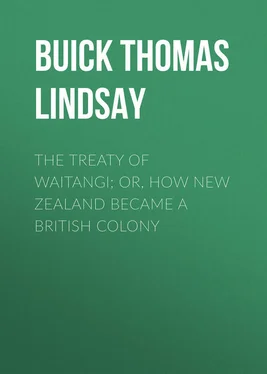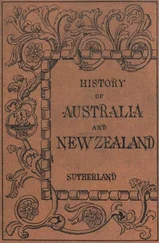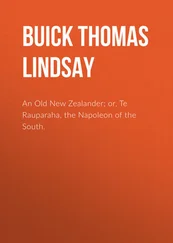Thomas Buick - The Treaty of Waitangi; or, how New Zealand became a British Colony
Здесь есть возможность читать онлайн «Thomas Buick - The Treaty of Waitangi; or, how New Zealand became a British Colony» — ознакомительный отрывок электронной книги совершенно бесплатно, а после прочтения отрывка купить полную версию. В некоторых случаях можно слушать аудио, скачать через торрент в формате fb2 и присутствует краткое содержание. Жанр: foreign_antique, foreign_prose, на английском языке. Описание произведения, (предисловие) а так же отзывы посетителей доступны на портале библиотеки ЛибКат.
- Название:The Treaty of Waitangi; or, how New Zealand became a British Colony
- Автор:
- Жанр:
- Год:неизвестен
- ISBN:нет данных
- Рейтинг книги:5 / 5. Голосов: 1
-
Избранное:Добавить в избранное
- Отзывы:
-
Ваша оценка:
- 100
- 1
- 2
- 3
- 4
- 5
The Treaty of Waitangi; or, how New Zealand became a British Colony: краткое содержание, описание и аннотация
Предлагаем к чтению аннотацию, описание, краткое содержание или предисловие (зависит от того, что написал сам автор книги «The Treaty of Waitangi; or, how New Zealand became a British Colony»). Если вы не нашли необходимую информацию о книге — напишите в комментариях, мы постараемся отыскать её.
The Treaty of Waitangi; or, how New Zealand became a British Colony — читать онлайн ознакомительный отрывок
Ниже представлен текст книги, разбитый по страницам. Система сохранения места последней прочитанной страницы, позволяет с удобством читать онлайн бесплатно книгу «The Treaty of Waitangi; or, how New Zealand became a British Colony», без необходимости каждый раз заново искать на чём Вы остановились. Поставьте закладку, и сможете в любой момент перейти на страницу, на которой закончили чтение.
Интервал:
Закладка:
The accompanying correspondence with the Law Officers will explain to you the grounds of law on which it is to be concluded that by the annexation of New Zealand to New South Wales the powers vested by Parliament in the Governor and Legislative Council of the older settlement might be exercised over the inhabitants of the new colony. The accompanying Commission under the Great Seal will give effect to this arrangement, and the warrant which I enclose under Her Majesty's sign manual will constitute you Lieut. – Governor of that part of the New South Wales colony which has thus been extended over the New Zealand Islands. These instructions you will deliver to Sir George Gipps, who on your proceeding to New Zealand will place them in your hands to be published there. You will then return it to him to be deposited amongst the archives of the New South Wales Government.
In the event of your death or absence the officer administering the Government of New South Wales will, provisionally, and until Her Majesty's pleasure can be known, appoint a Lieut. – Governor in your place, by an instrument under the public seal of his Government.
It is not for the present proposed to appoint any subordinate officers for your assistance. That such appointments will be indispensable is not, indeed, to be doubted. But I am unwilling at first to advance beyond the strict limits of the necessity which alone induces the Ministers of the Crown to interfere at all on this subject. You will confer with Sir George Gipps as to the number and nature of the official appointments which would be made at the commencement of the undertaking and as to the proper rate of their emoluments. These must be fixed with the most anxious regard for frugality in the expenditure of public resources. The selection of the individuals by whom such offices are to be borne must be made by yourself from the colonists either of New South Wales or New Zealand, but upon the full and distinct understanding that their tenure of office, and even the existence of the offices which they are to hold must be provisional and dependent upon the future pleasure of the Crown. Amongst the offices thus to be created, the most evidently indispensable are those of a Judge, a Public Prosecutor, a Protector of the Aborigines, a Colonial Secretary, a Surveyor-General of Lands, and a Superintendent of Police. Of these, the Judge alone will require the enactment of a law to create and define his functions. The Act now pending in Parliament, for the revival, with amendments, of the New South Wales Act will, if passed into law, enable the Governor and Legislative Council to make all necessary provision for the establishment in New Zealand of a Court of Justice and a judicial system separate from and independent of the existing Supreme Court. The other functionaries I have mentioned can be appointed by the Governor in the unaided exercise of the delegated prerogative of the Crown. Whatever laws may be required for the Government of the new colony will be enacted by the Governor and Legislative Council. It will be his duty to bring under their notice such recommendations as you may see cause to convey to him on subjects of this nature. The absolute necessity of the revenue being raised to defray the expenses of the Government of the proposed settlement in New Zealand has not, of course, escaped my careful attention. Having consulted the Lords of the Treasury on this subject I have arranged with their Lordships that until the sources of such revenue shall have been set in action, you should be authorised to draw on the Government of New South Wales for your unavoidable expenditure. Separate accounts, however, will be kept of the public revenue of New Zealand and of the application of it and whatever debt may be contracted to New South Wales, must be replaced by the earliest possible opportunity. Duties of impost on tobacco, spirits, wine, and sugar will probably supersede the necessity of any other taxation, and such duties except on spirits will probably be of a very moderate amount.
The system at present established in New South Wales regarding land will be applied to all the waste lands which may be kept by the Crown in New Zealand.
Separate accounts must be kept of the Land revenue, subject to the necessary reductions for the expense of surveys and management, and for the improvement by roads and otherwise the unsold territory, and subject to any deductions which may be required to meet the indispensable exigencies of the local Government. The surplus of this revenue will be applicable, as in New South Wales, to the charge of removing emigrants from this kingdom to the new colony.
The system established in New South Wales to provide for the religious instruction of the inhabitants has so fully justified the policy by which it was dictated that I could suggest no better means of providing for this all-important object in New Zealand. It is, however, gratifying to know that the spiritual wants of the settlers will, in the commencement of the undertaking, be readily and amply provided for by the Missionaries of the Established Church of England and of other Christian communions, who have been so long settled in those Islands. It will not be difficult to secure for the European inhabitants some portion of that time and attention which the Missionaries have hitherto devoted exclusively to the aborigines.
I enclose, for your information and guidance, copies of a correspondence between this department and the Treasury, referring you to Sir George Gipps for additional instructions as may enable you to give full effect to the view of Her Majesty's Government on the subject of finance. You will observe that the general principle is that of maintaining in the proposed colony a system of revenue, expenditure, and account entirely separate from that of New South Wales, though corresponding with it as far as that correspondence can be maintained.
After briefly describing the rules to be observed by Captain Hobson in conducting his correspondence with his immediate superior, Governor Gipps, and the Colonial Office, Lord Normanby concluded his instructions as follows:
I have thus attempted to touch on all the topics on which it seems to me necessary to address you on your departure from this country. Many questions have been unavoidably passed over in silence, and others have been adverted to in a brief and cursory manner, because I am fully impressed with the conviction that in such an undertaking as that in which you are about to engage much must be left to your own discretion, and many questions must occur which no foresight could anticipate or properly resolve beforehand. Reposing the utmost confidence in your judgment, experience, and zeal for Her Majesty's service, and aware how powerful a coadjutor and how able a guide you will have in Sir George Gipps, I willingly leave for consultation between you many subjects on which I feel my own incompetency, at this distance from the scene of action, to form an opinion. 42 42 Vide his instructions to Captain Hobson, August 14, 1839.
The publication of this document brought down upon the head of the Minister a storm of criticism from the committee of the New Zealand Company, who attacked with especial bitterness that portion of the instructions wherein Lord Normanby made it especially clear that Britain claimed no right of sovereignty in or over New Zealand. In the previous year, when the Company was promoting its Bill in the House of Commons, and when the organisation was less mercenary in its nature, the promoters had taken a modified view of this question of sovereignty, and were prepared to concede something to the natives which, as a Company, they were now eager to deny.
This earlier attitude was admirably expressed by the Rev. Dr. Hinds, who in discussing the matter before the Committee of the House of Lords, boldly stated that he believed civilised people had a right – an inherent right – over countries that have not been subject to civilisation, whether those countries were uninhabited or partially inhabited by savages who were never likely themselves to cultivate the country. "Here," he said, "is a country considered to be populous for a savage country. According to an estimate made by a respectable Missionary of the C.M.S. the inhabitants of the Northern Island amount to about 105,000. This Northern Island is probably about the size of England, and this its population of 105,000 stated to be decreasing in number without the least chance of their becoming cultivators or sovereigns of the soil. I hold it not to be an infringement of any natural rights to claim the sovereignty of the Island, and this is a claim which until lately would never have been questioned. There has been often a question as to the mode in which sovereign rights over savage countries should be distributed among civilised people, but it has been a question between one civilised country and another. Formerly the Pope used to claim the disposal of sovereignty. Subsequently it has been more conveniently settled by allowing the priority of claim to the first discoverers – a course as convenient probably as can be advised. Within the last few years, however, the justice of this claim has been questioned, and it has been asserted that savage as well as civilised men have sovereign rights. I do not, myself, think they have; but it has been the wish of the Association not to offend any scruples, and therefore they have carefully in this Bill waived the question, and allowed the claim to a sovereign right of some kind to exist in those savages. I say a sovereign right of some kind, because it is clear in the instance just mentioned, the giving the flag to the Bay of Islands, that the very assumption on the part of Great Britain of a right to give that flag supposes the New Zealanders not to be altogether a sovereign power. Many probably who may be willing to cede to them the right of sovereignty as far as concerns themselves would not go to such lengths as to say that Great Britain should not cede the sovereignty as regards any right which may be put in by other nations; and I do not know on what principle we should draw a distinction, and say how much or how little of this right of sovereignty we should claim. The French have been attracted by the flax: suppose they were to say 'If you relinquish your rights of sovereignty we will put in our claim, we stand next,' or the Dutch may say so. I do not know which visited the country first, but I cannot see on what principle we could interfere with the French or Dutch unless we contend that we had some disposal over the sovereignty of the Islands. The question, however, has been waived in the Bill; we suppose the New Zealanders and not Great Britain to be in possession of the right of sovereignty, and we propose accordingly that a purchase should be made of the sovereignty as well as the fee simple of the land. We have some precedents for this. I do not know whether it is of consequence to bring forward precedents, but even at a late period a purchase of this kind has been made; Sir Stafford Canning took possession in 1815 of Singapore; it was at that time in possession of the Malays, the subjects of the Sultan of Jahore. In 1825 he found, I think, some inconvenience arising from the Sultan's claims, and the English bought the Domain of the Sultan for a sum of money, and so clear was the understanding about it, that the Sultan made some reservations; some exceptional laws, as they are called in this Bill, were made. There was a clause that the Sultan's slaves should not be emancipated, and certain lands were reserved and became entailed property and inalienable. When Penn purchased Pennsylvania he no doubt understood he purchased the sovereignty as well as the fee simple of the land, for I can conceive no one mad enough to found a colony in the midst of barbarians without securing the colonists against their interference as sovereigns. Vattel certainly speaks of Penn's treaty as if he understood him to have purchased the sovereign rights as well as the fee simple. These are precedents which may not be considered as carrying any great authority. The question has not been very much discussed; it has been taken for granted, and I think with reason, that the savage is in a state of pupilage, and must be treated as we treat children. The only principle which it is important to maintain is this: If you go into a country at all inhabited by savages and take possession of their land and become sovereigns of it, you infringe their rights if you do not consider their benefit as well as your own. If you were treating with a child you would not infringe the rights of that child simply by acting and deciding for him, but you would infringe his rights if you acted and decided for your benefit and not his. So with respect to savages; they are compared with civilised men, like children. They are of themselves incapable of acquiring the arts and habits of civilised life; unless some interference that amongst civilised men would be considered unjust, takes place, they never can, by themselves, rise to that higher condition. The injustice to be deprecated is that of seeking our own benefit solely and not theirs; and with respect to the New Zealanders our purchase of the sovereignty of their country ought not to be represented as being the same kind of bargain as if the French, for instance, were bargained with to cede the sovereignty over any portion of their territory. When the French ceded their sovereign rights over Martinique, Guadaloupe, and the Mauritius, they strictly ceded all their sovereign rights; but in the present instance what is meant by the cession of sovereignty amounts to this – that we purchase the right to participate in the sovereignty with them; we do not wish to exclude them, but pay them a price to partake in the sovereignty with them. Of course, in the first instance, the civilised man will be the only sovereign, but that is because he only will be fit and capable of exercising sovereign rights. As the savage advances in civilisation he will come in for his share; and I see no reason, as soon as the New Zealander is capable of it, against his being Chief Justice, Governor, or Bishop, or holding any other office. It is not therefore that we take the sovereignty from him; we purchase the right of participating with him in the sovereignty, and by so doing we enable him to become Sovereign of the country, which he is not at present."
Читать дальшеИнтервал:
Закладка:
Похожие книги на «The Treaty of Waitangi; or, how New Zealand became a British Colony»
Представляем Вашему вниманию похожие книги на «The Treaty of Waitangi; or, how New Zealand became a British Colony» списком для выбора. Мы отобрали схожую по названию и смыслу литературу в надежде предоставить читателям больше вариантов отыскать новые, интересные, ещё непрочитанные произведения.
Обсуждение, отзывы о книге «The Treaty of Waitangi; or, how New Zealand became a British Colony» и просто собственные мнения читателей. Оставьте ваши комментарии, напишите, что Вы думаете о произведении, его смысле или главных героях. Укажите что конкретно понравилось, а что нет, и почему Вы так считаете.












